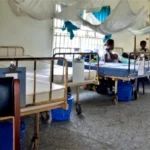Brain Drain: Nigerian Doctors Pursue Careers Abroad, Healthcare System Suffers Blow

In a disheartening turn of events, Professor Emem Bassey, the Chairman of the Committee of Chief Medical Directors/Medical Directors of Federal Tertiary Hospitals, expressed deep concern over the exodus of healthcare professionals from Nigeria, which is fueling a critical manpower crisis within the sector.
Highlighting this grave challenge, Prof. Bassey, who also serves as the CMD of the University of Uyo Teaching Hospital, revealed that several other African nations are actively enticing Nigerian medical doctors and health experts to their shores. He disclosed this revelation during his appearance before the House of Representatives’ ad hoc committee investigating employment malpractices within Federal Government agencies. Accompanied by the leaders of various healthcare institutions across the nation, Prof. Bassey painted a stark picture of the ongoing predicament.
Prof. Bassey’s statement echoed the troubling sentiment: “A number of African countries are now scouting talents from Nigeria. The West Coast is casting their gaze upon our specialized professionals. An increasing number of individuals are venturing to places like Sierra Leone and Gambia, enticed by salaries amounting to around $3000 to $4000, a considerable three to four times what they earn in their homeland.”
Unraveling the complex tapestry of the manpower crisis, Prof. Bassey expounded on the matter, revealing a substantial drain across various healthcare domains. “This phenomenon is not limited to just doctors; even nurses, laboratory scientists, physiotherapists, radiographers, and a range of healthcare experts are departing the country en masse.”
He underlined, “This quandary constitutes a major stumbling block for us. The replacement of these healthcare professionals poses an immense challenge. While we often secure approval for recruitment, the process of obtaining the necessary waivers is a formidable ordeal.”
With the urgent necessity to fill the void created by departing professionals, Prof. Bassey illuminated the intricate challenges involved in complying with federal character guidelines for recruitment. The urgency of the situation often clashes with the need to adhere to these principles.
Meanwhile, the committee’s chairman, Yusuf Gagdi, urged the medical community to rally behind their homeland and contribute to the nation’s growth. He acknowledged the shortfall in advanced medical infrastructure while stressing the importance of patriotism. Gagdi underscored, “Although there is an evident lack of cutting-edge medical facilities in our healthcare sector, we, as a government, must address this. The area where our stance is unclear lies in the realm of patriotism. Remember, you were nurtured by Nigerian institutions.”
Gagdi assured, “We will thoroughly review your submissions. Institutions currently grappling with pending recruitment cases will receive personalized attention.”
The Nigerian healthcare sector, beset by the departure of skilled professionals, faces a formidable crossroads that calls for an innovative approach to talent retention and the creation of an environment conducive to the growth of medical expertise.


